(Strand)om Stories: Greenberg the Vampire Review
A fairly thoughtful examination of religion, culture, and character through the lens of vampirism
—by Nathan on November 18, 2025—
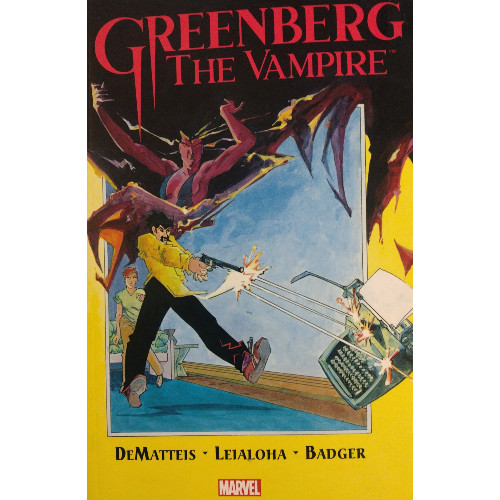
Oscar Greenberg doesn't "vant" to suck your blood…he "vants" to suck you into his latest manuscript.
If he ever finishes writing anything, that is.
It isn't like the guy doesn't have a wealth of experience to select from: he's a Jewish-American man living in New York, for one, which would seem to provide some engaging material. Or how about the fact he has a mother with a heart condition he has to help care for alongside his brother and lovable loser of a nephew? You could make a story out of that. Or what if he wrote about how he's been a vampire ever since his girlfriend Denise gave him a little peck, and by "peck," I don't mean "kiss"?
Yep, Darlene accidentally (no, seriously, total accident!) nibbled the guy, and he's had a hankering for blood ever since.
Just don't tell his mother.
If you think "Jewish-American vampire author" sounds like a wild concept with plenty of intrigue behind it, you can thank J.M. DeMatteis for that particular idea. Because I recently reviewed a completely different DeMatteis narrative about a vampire who is clearly not Jewish, I wanted to walk a little further down the horror trail and see what else he offered in a similar "vein." I actually have a few horror-inspired reviews lined up for publishing here, my only regret being that my poor timing prevented me from posting these during October. It woulda been perfect.
Though Oscar and his friends never mingled with the Marvel Universe, it was Marvel themselves who collected and published DeMatteis' two-part narrative–told across a Bizarre Adventures issue and one of those glossier, supposedly more sophisticated original Marvel Graphic Novels–meaning I'm reviewing Oscar's adventures under the ol' "(Strand)om Stories" banner. It's a little diversion from the regular capes-and-cowls mayhem I specialize in reviewing, though through this review, you'll find a narrative which is just as compelling as Spidey trouncing the Rhino…and, heck, hopefully more so.
Greenberg the Vampire
Writer: J.M. DeMatteis
Pencilers: Steve Leialoha and Mark Badger
Inkers: Steve Leialoha and Mark Badger
Colorist: Mark Badger
Letterers: Tom Orzechowski and Joe Rosen
Issues Collected: Material from Bizarre Adventures #29 and Marvel Graphic Novel #20
Volume Publication Date: September 2015
Issue Publication Dates: December 1981 and March 1986
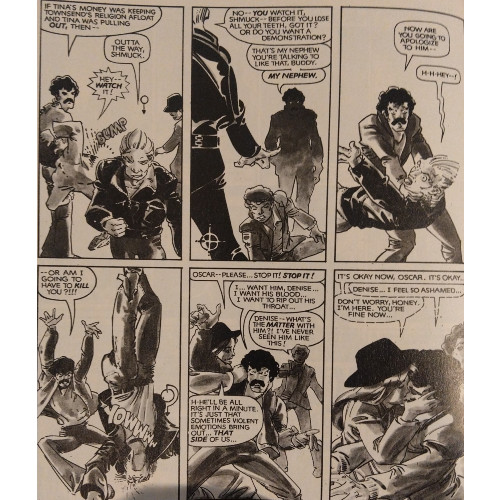
I've read a few reviews which mention how Oscar speaks to the Jewish-American experience, and since I don't have any exposure to that experience myself, I feel I cannot speak to it outside of broad strokes. DeMatteis inserts elements which I assume readers have latched onto, including direct references to religion and Jewish ceremonies and the nature of Oscar's relationship with his mother, but I don't feel knowledgeable enough to speak to how well Oscar exists within that particular sphere. Therefore, I recognize DeMatteis' efforts, but I will be speaking on these stories' perspective from a more general "human nature" perspective.
Imagine, however, being born into a culture constructed on rules that have been followed for millennia and then becoming something which flies (sometimes literally!) in the face of at least some of those rules. Oscar's religious life and his personal life find themselves, in a way, at odds when he's transformed into a denizen of the night craving blood. He's gotta find a way around the whole "drain people" caveat of being a vampire, settling for animal blood provided by his brother; he hides his secret from his mother, finding solace in a counterculture ring of fellow vampires while never telling her of his condition, which would certainly cause her untold agony and brand him as something vile, perhaps even satanic; religious iconography, such as the Star of David, work very similarly to a cross, causing him pain. He's a man consigned to living two lives, which are drastically intertwined in some ways.
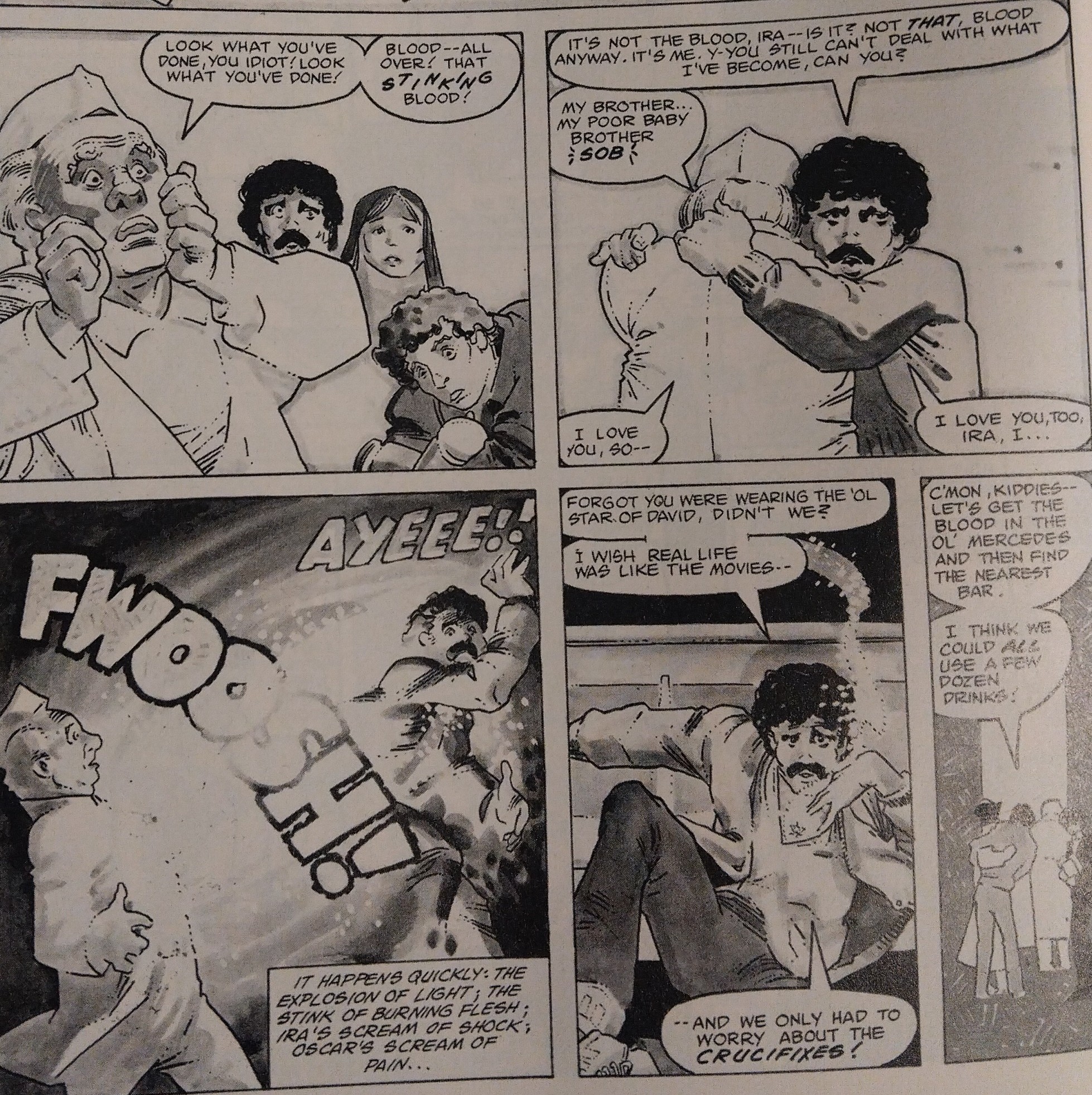
"Guilt" is factored largely into these narratives, in ways which work within Oscar's specific experience but also can be read in more broadly applicable forms. Oscar is troubled by the secrets that he keeps from his mother and the stress of remaining hidden; he's bothered by the seeming "unprintable drivel" he produces on his typewriter, swearing that autobiography is "the cheap way out" while pandering to the masses through possibly even cheaper stabs at fiction; he's haunted by a few past mistakes which arise in the present and challenge his faithfulness to Denise. Dissatisfaction flows through his veins where he hopes there would be ink, and he finds himself challenged by facing his present struggles while carving (mmm…that's more of a "werewolf" verb, isn't it?) a future for his career. What's a budding, blooding writer to do?
There are singular plots to each narrative DeMatteis develops, but I found the characters the strongest aspect of these stories. Oscar and his allies are threatened by those who would either do away with vampires or seek to corrupt them, possibly exposing their secrets to the general public. Oscar, whose life was permanently changed by an accident, does all he can to keep the media away and the general public in the dark about his personal details (except, maybe, for when money is involved, which becomes another struggle when Oscar gets the chance to guide one of his stories to the big screen…will this finally be the break he's been seeking???), protecting not only himself but the subculture of vampires he belongs to. DeMatteis treats this underground movement like you would any other oppressed group, people who are hunted for their nocturnal, preternatural habits, even if they can't help it. You're meant to feel sympathy for Oscar and Denise, trying to find comfort in a subset of society which embraces who they are while hiding from the rest of the world.
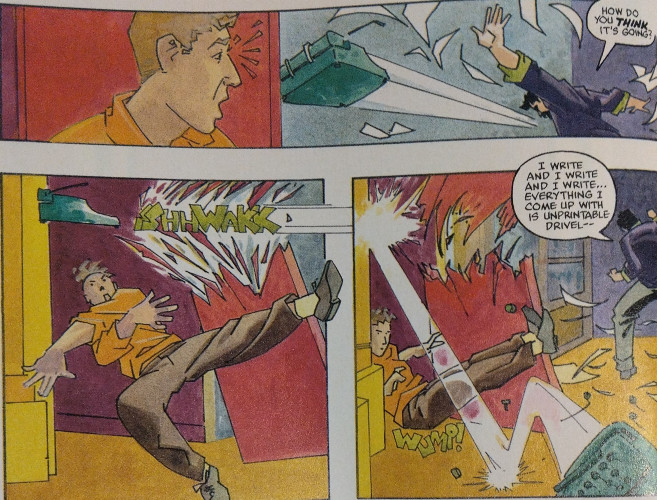
The plots provide a sense of movement to each tale, which work fine. The first narrative, taken from Bizarre Adventures #29, is a fairly short romp as Oscar and Darlene seek to uncover a mysterious murder involving a religious figure. The second is lengthier, telling a more complete tale involving a serial killer and heavier themes than the first. Through Bizarre Adventures #29, DeMatteis does lay the groundwork for the characters and adds some fun flourishes–like Oscar's solution for sating his bloodlust, his somewhat fashionable coffin he sleeps in during the day, or the vampire's amusing penchant for bumping into glass windows as bats–but the story is told fairly quickly and involves a late twist near the end which doesn't unfold as well as I would have hoped. The twist adds a new dimension to a character which kiiiinda works, teased somewhat briefly near the narrative's start then made suddenly important near the end. The concept is tethered to the overall thematic element, that of guilt arising from Oscar and Darlene's vampiric states (used, fairly subtly by DeMatteis, as a metaphor for religious tension, even though that specific tension itself is apparent), but that rise occurs a bit too quickly.
Marvel Graphic Novel #20 is a different nocturnal animal, told more completely and allowing DeMatteis the space necessary to build off the foundation he previously laid. This is where we come to understand Oscar's mind more fully, his desires, his hopes for the future. This is where we see his relationship with Darlene and his mother in somewhat more detail. This is where another twist, also delivered fairly late in the story, carries with it a more understandable execution and better ramifications, especially as the plot reaches its action-packed zenith.
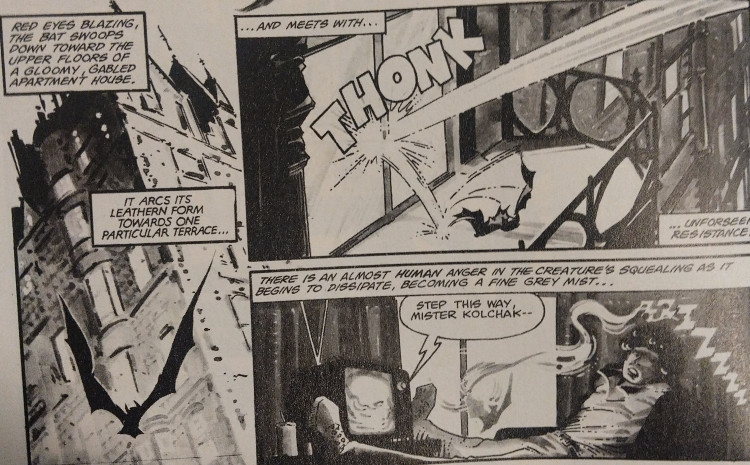
The graphic novel is also where, through some of Oscar's own writings, I feel we're allowed insight into DeMatteis' perspective of the world. Eskewing dialogue for longer prose sections, DeMatteis applies an appropriate poetic tone in detailing his thoughts. Elsewhere, we're given glimpses into the fiction Oscar considers drivel, and though Oscar himself hates his words, I actually found I was entertained by the pieces we receive. They're silly, made intentionally outlandish by DeMatteis, but they possess a charm Oscar cannot see because he's taking these seriously, not meant to be observed as nearly satirical or parodic in the way DeMatteis intends.
Wonderfully, a final piece written by Oscar shifts his writing style and tone and actually marks, in my opinion, the highlight of the entire volume. Here, DeMatteis fantastically creates a voice for Oscar which feels genuine and raw and may be, in some places, DeMatteis actually pouring his heart and experiences onto the typewritten page. I don't know enough about DeMatteis as a person to know how much he connected himself to Oscar, but if he did, these pages are where he creates the greatest tether and reveals himself to the reader…and if he didn't, then dang, he does a great job approximating Oscar's relatability as a character. In a narrative dominated by the genre's defining panels and word balloons, it's two-and-a-half pages of text which become the most focused, heartfelt part of the whole volume. It provides catharsis for Oscar, an outpouring of feeling which captures who he is amidst the myriad stressors he experiences.
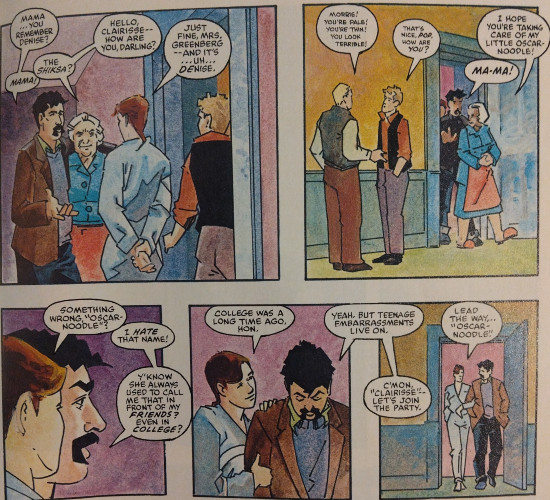
Artistically, Steve Leialoha and Mark Badger provide two completely different reading experiences which I feel work well within their individual contexts. Leialoha provides pencils and inks for Bizarre Adventures #29's black-and-white aesthetic, drawing us into a colorful world and subculture that actually has no color. It may just have been the series' constraints which forced the lack of color, but Leialoha works well within those confines, creating in characters fantastically discernible features and a gritty looking New York that feels appropriately bleak given the subject matter.
Badger's introduction of color in Marvel Graphic Novel #20 provides a different feel to the narrative, pencils replaced with brushstrokes and creating a vibrancy the prior narrative lacks, fitting in with the line's penchant for more enriching, painterly material. DeMatteis offers no less a serious story, but Oscar's first appearance felt more based on street level sensibilities, the black-and-white allowing it that seriousness. The graphic novel is more character driven, the story lit by a vibrancy through its main characters, more flamboyant locals, and its inclusion of deeper religious themes and iconography. A female vampire is painted purple, and for this alone, the color is needed to set her apart from the rest of the cast, providing her a more sinister appearance as she skulks in shadows and reminding me, visually, of Dave McKean's Black Orchid. Badger provides the narrative a less grounded appearance, creating environments that are more felt through the color than seen in deeper concrete details.
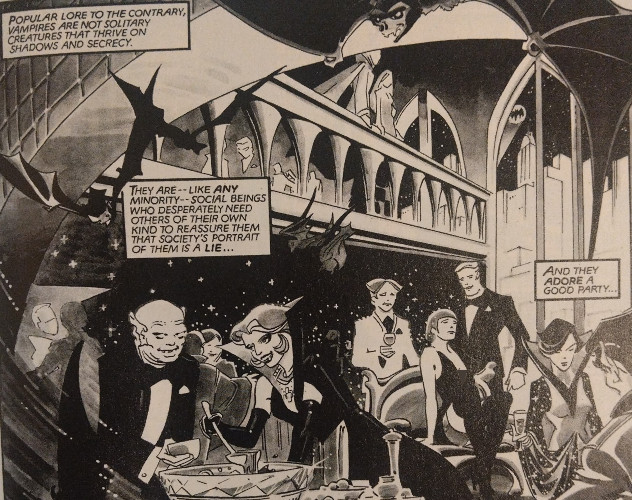
DeMatteis, along with his artists, crafts a couple of plots which are fine–they can bear the narratives aloft on their thin wings through the dark night sky, but they're subservient to the characterization provided. Oscar and his small band of misfits play supernatural detectives, but the real mystery is how our blood-sucking bard is going to develop across the pages. What kind of writer will Oscar become? Will he ever tell his mother his secret? How will he wrestle with the religious institutions of his birth and his personal desires, fears, and hopes? DeMatteis juggles those pieces of identity better than the stories themselves, but it's what you buy the volume for: the people, vampiric or otherwise. I'm not Jewish, but I can recognize the divide between finding personal fulfillment and straddling the line of religion within one's family and culture. Who you want to be vs. who others say you should be. How do you navigate such pressures? Where do you stand up for yourself and where do you acquiesce? These are the questions Oscar grapples with as both blood and ink flow, and if you strip away some of the supernatural story beats, you might find yourself asking variations of similar questions yourself.